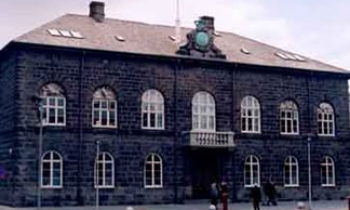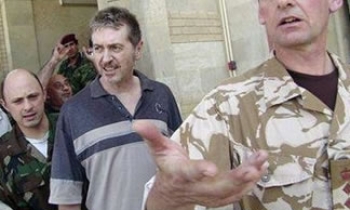Tampa radio personality Tedd Webb has one thing to offer reporters - or anyone else - who reveals details of any secret government program aimed at fighting terrorism during the current war.
A bullet.
Sparked by several newspapers' publication of stories on the Treasury Department's monitoring of terrorist suspects' money transfers worldwide, Webb told listeners to his radio show on WFLA-AM 970 that anyone who derails such a program during wartime should be charged with treason and executed.
"When it is a Top Secret operation, it is NOT the job of the press to determine what is appropriate to release and what is not," wrote Webb in an e-mail to the St. Petersburg Times Tuesday. "The problem ... is that media does not see the terrorist threat."
Webb's barbs have been echoed by a chorus of other conservative critics, from a National Review editorial suggesting the White House revoke press credentials for New York Times reporters to calls from legislators such as U.S. Rep Jim King, R-N.Y., and U.S. Sen. Jim Bunning, R-Ky., that the attorney general investigate the newspapers for treason.
As the week progressed, the blowback only grew: from a House of Representatives vote condemning reporting on classified information to another call to revoke the New York Times' White House credentials, this time from a Texas representative.
Led by the New York Times, several newspapers, including the Wall Street Journal, Los Angeles Times and Chicago Tribune, have published stories detailing the program. Editors at several of those newspapers also published stories explaining their decision - citing concerns over a lack of congressional oversight and a conclusion that no lives were directly threatened by revealing the information.
Still, the chairman of the Senate Intelligence Committee, Pat Roberts, R-Kan., also criticized the New York Times last week, joining other congressmen who have called for a tightening of espionage laws. And a long roster of administration officials, including President Bush, Vice President Dick Cheney, press secretary Tony Snow and outgoing Treasury Secretary John Snow, have all condemned the reports.
Tempting as it is to shrug off such comments as election-year politicking or Ann Coulter/Michael Moore-style posturing, the deluge of calls for official governmental action have raised some important questions about press freedom.
Do threats by politicians to prosecute journalists for treason themselves chill the journalism process? Is it notable that journalists at media outlets such as National Review and Fox News Channel are among those urging the government to punish other reporters?
And does it make sense that, as the United States fights a war dedicated to bringing democracy to the Middle East, legislators would contemplate bolstering that effort by cracking down on newspaper reporters back home?
"I don't take these complaints at face value ... I think it's about seizing an opportunity; an ongoing campaign against the press," said Craig Crawford, a political columnist and author of the book Attack the Messenger: How Politicians Turn You Against the Media. "It is part of a comprehensive effort to make the public believe all the bad news we're hearing about administration efforts is because the news media is against them and on the side of terrorists."
Crawford's book says administration officials have cited Abraham Lincoln's precedent in suspending civil liberties for war prisoners in their treatment of detained terrorist suspects. He notes Lincoln also took action against journalists, sending troops to shut down two New York newspapers for unknowingly printing articles based on forged documents.
"That's what's scary about when presidents start using these executive powers," said Crawford, who also writes a column for Congressional Quarterly magazine, which is owned by the St. Petersburg Times' parent company. "If George Bush released an executive order tomorrow to shut down the New York Times, I'm not so sure a majority of Americans would have a problem with it. Our rights (as journalists) are only preserved in the long run if the public believes in them."
Indeed, New York University professor Jay Rosen has written often about his theory that the Bush administration attempts to "decertify" the press by resisting the notion that it represents the people at all. In this view, the press is just another special interest, trying to build its own power by playing "gotcha" with government officials.
From this perspective - echoed by many conservatives - limiting journalists doesn't necessarily add up to limiting free speech, because the press' status as an institutional watchdog of government isn't recognized.
"Here you are in a situation where the Republican and the Democratic chairmen of the 9/11 commission are telling you not to run the story ... (and) you're still saying you know better than these people," said Tim Graham of the conservative watchdog group Media Research Center, referring to the fact that administration officials and other politicians asked journalists not to print the banking records story.
Critics also point to instances when news outlets get the story wrong: from CBS News' flawed reporting on President Bush's National Guard service to USA Today's move Friday to retract parts of its May 11 story on the National Security Agency spying on domestic phone calls (the newspaper now admits it could not prove BellSouth or Verizon, two of three companies named in the May story, cooperated with the government).
"These people are acting as if criticizing them is opposing democracy ... but attacking newspapers is what you can do in a democracy with your free speech," said Graham. "For us, the central question is, who elected these (journalists) to decide what can be debated? From our perspective, these reporters get up every day and they're trying to decertify the president."
But Jane Kirtley, a professor of media ethics and law at the University of Minnesota, noted that America's 89-year-old espionage law has never been used to prosecute journalists, despite many instances when government officials considered it.
Some examples: During World War II, the Chicago Tribune published a story indicating that America had cracked the Japanese communication codes. In the 1970s, newspapers published the top-secret Pentagon Papers, which revealed the sordid history of America's involvement in Vietnam. During the mid 1980s, NBC revealed that an accused spy may have tipped the Soviets to a top-secret, submarine-based spying program.
For Kirtley, the tension between a government that keeps secrets and a press that seeks to expose them is important and necessary in a free society. And although critics can argue specific stories on government secrets shouldn't be published, the professor said relieving that tension by restricting journalists only brings new problems.
"If we're going to allow prosecution of the press for publication of certain facts, what we've done is create an Official Secrets Act, like Great Britain," she said. "I think the founders of this country would be horrified at the notion that the government would classify publication of information as a crime."
In fact, an Internet search on the terms "journalist" and "treason" unearths stories of prosecutions in countries that read like a who's who of media oppression: China, Russia, Ethiopia, Peru. As the United States tries to sell the Muslim world on democracy, are these the examples of press freedom the country should emulate?
Steven Scully, political editor for C-SPAN and a board member of the White House Correspondents' Association, remains hopeful the tough talk by legislators will remain just that.
"It appeals to a certain base in the Republican Party, and the New York Times may be an easy target. ... In the end, I don't think anything will come of it, though the rhetoric may be more intense now," Scully said.
"You're always concerned any time an administration says they will investigate people who leak information," he added. "But I'll give you the analogy given me by (USA Today editor) Ken Paulson: If a teller is working in a bank and realizes the president is stealing money, he should be able to get that information out to the public without harm to himself."
Times researcher Carolyn Edds contributed to this report. Eric Deggans can be reached at (727) 893-8521 or deggans@sptimes.com See his blog at www.sptimes.com/blogs/media.









